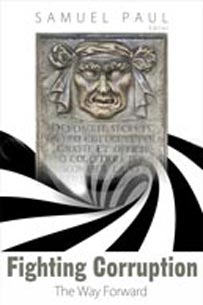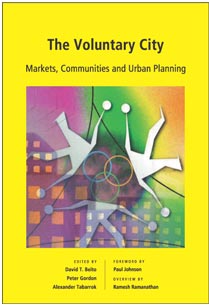Catalogue
›
‹
-
Socio-economic / -political /1 of 18Brochure
Fighting Corruption
The Way Forward
Samuel Paul (Ed.)
About the Book
<p>More people today are ready to fight corruption in India’s public life than ever before. Very few, however, know what it takes to achieve corruption free governance. The causes and manifestations of corruption are multiple and complex. In the final analysis, it is actions by the state, its institutions and civil society that are critical to achieving corruption control. We need both preventive and punitive measures to successfully fight corruption. </p> <p> </p> <p>This book examines the phenomenon of corruption from multiple perspectives and proposes an agenda of reform that has the potential to achieve corruption control. The contributors to this volume believe that without a major reform of India’s rather opaque and dysfunctional governance system, corruption free governance will remain a mere dream. Reform of the financing of political parties and elections, ways to minimise conflicts of interest and the capture of policymaking and regulatory regimes, redesign of service delivery systems, the scaling up of e-Governance to enhance transparency and accountability, and support to several important reforms already under way in government, are the way forward to effectively bring corruption under control.</p>
Socio-economic / -political /2 of 18BrochureThe Nature and Grounds of Political Obligation in the Hindu State
New Edition of The Original 1935 Classic
J.J. Anjaria
About the Book
<p>Professor J.J. Anjaria presents a lucid overview of the role of the State in Hindu thought and its connection to the modern State. The starting point is Dharma, which in Hinduism furnishes the elegant conceptual framework to understand the universe—and thereby also the nature of political obligation and the purpose of human activity. In particular, Hindu thought sees the State and its rulers as subservient to Dharma.</p> <p> </p> <p>Prof. Anjaria argues that in modern times State regulation of men and institutions based on birth, power, wealth, or gender will block the fulfillment of the individual’s true aspirations and the development of a harmonious society. He calls for a renewed concept of Dharma, which would allow the State, in a true democracy, to fulfill its crucial role of supporting individual human endeavor. This requires moving away from the old view of Dharma, which over the centuries came to be implemented as a rigid, static set of rules that sought to preserve a status quo. </p> <p> </p> <p>This work offers fresh insight into ancient Hindu political theory and a new perspective on Prof. Anjaria’s scholarship.</p>
Socio-economic / -political /3 of 18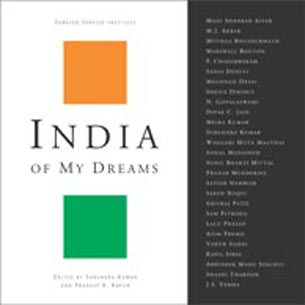
Hard-cover • 2008
Pages: 230
ISBN 9788171886890
INR 1295
+ Add to Cart
Publisher:Academic Foundation
BrochureIndia of My Dreams
Surendra Kumar‚ Pradeep K. Kapur (Eds.)
About the Book
<p>A unique collection of thoughts, ideas, views and vision of some of the brightest brains and most respected individuals—from senior cabinet ministers to role model captains of industry; from internationally acclaimed economists to diplomats par excellence and think-tank honchos; from IT innovators to provocative journalists—all jostle together in this volume sharing glimpses of India of their dreams.</p> <p> </p> <p>Sheer diversity of subjects, strength of arguments, force of articulation and the breadth of vision is sure to provoke the reader to think about India…</p>
Socio-economic / -political /4 of 18
Hard-cover • 2006
Pages: 570
ISBN 9788171885640
INR 1995
+ Add to Cart
Publisher:Academic Foundation
BrochureIndia The Next Decade
Manmohan Malhoutra (Ed.)
About the Book
<p align="justify" style="color: rgb(0, 0, 0); font-family: Verdana; font-size: 11px; line-height: normal; margin-top: 0px; margin-bottom: 12px;"><font size="2">The story of a rising India has surprised the world but also captured its imagination. It is said that no other democracy has ever achieved levels of sustained economic growth comparable to India's over the last two decades. Exploring India's growing global importance and its domestic and external challenges, this unique volume examines the complexities of India's political, economic, and social evolution in the coming decade.</font></p> <p align="justify" style="color: rgb(0, 0, 0); font-family: Verdana; font-size: 11px; line-height: normal; margin-top: 0px; margin-bottom: 12px;"><font size="2">Combining lively discussions with back-ground essays contributed by a galaxy of prominent individuals from different spheres of life—distinguished scholars, policymakers, economists, corporate leaders, journalists, educationists and film-makers—the book offers compelling insights into the democracy, economy, and society of an emerging power.</font></p>
Socio-economic / -political /5 of 18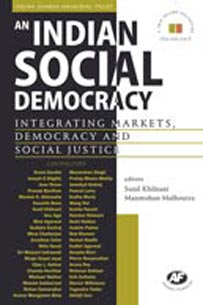
Hard-cover • 2013
Pages: 428+320
ISBN 9788171889945
INR 1995
Twin volume collection
+ Add to Cart
Publisher:Academic Foundation
BrochureAn Indian Social Democracy
Integrating Markets, Democracy and Social Justice
Sunil Khilnani‚ Manmohan Malhoutra (Eds.)
In association with Indira Gandhi Memorial Trust, New Delhi
About the Book
<p>India's recent economic growth, in a society where most remain poor and benefits are unequally distributed, poses dilemmas for policy makers and analysts. Do rapid growth and widespread inequality necessarily go hand in hand ? Can inequality be lessened without impeding the growth essential to sustain social spending ? What is a sustainable pattern of growth ?</p> <p> </p> <p>India, historically committed to a path of social democratic progress, is taking important steps to mitigate social risk and inequality: Examples include the National Rural Employment Guarantee Act, the Right to Education Act, legislation on food security, as well as introduction of innovative delivery mechanisms. Building on these initiatives, India's challenge now is to create an integrated political vision based on a three-fold commitment: to the values of social justice, to the instruments of markets, and to the processes of democracy.</p> <p> </p> <p>Can India rise to this challenge ? What hurdles—cultural no less than political and economic—stand in the way of realising its social democratic ideals ? Are current priorities appropriate ? Such questions and how they might be addressed animate this remarkable twin volume collection.</p> <p> </p> <p>An array of some of the world's leading minds—scholars and intellectuals, policymakers and politicians—draw upon both the global and Indian experience of social democracy, to offer lessons from the many struggles to align competitive markets, democracy and social justice.</p> <p> </p> <p>They reflect, too, on the changing contours of social democracy in the context of globalisation, environmental stress and the market economy's limitations. Putting India's social democratic agenda and ambitions to critical scrutiny, issues are raised that challenge the political and ethical imagination of policymakers and citizens. Insights emerge that make this collection an illuminating read.</p>
Socio-economic / -political /6 of 18BrochureReservation Policy and its Implementation across Domains in India
An Analytical Review
Niranjan Sahoo
About the Book
<p>India runs the world's oldest and one of the most comprehensive affirmative action policies in the form of reservations or quotas for its disadvantaged sections. Ever since its adaptation, this critical public policy remains the most controversial and polarising public policy that the Independent India has adopted as yet. While much of the national preoccupation over reservation have been devoted to debate its necessity and relevance in addressing exclusion and inequality, the country still seems to lack a data-based understanding of its enforcement across different domains. How earnestly state and its agencies have enforced the reservation policies? We know less about the trends of implementation in different domains and how or what percentage of population among these social groups have benefited from it. Fact is there are very few credible research studies on the issue of affirmative policies in India. </p> <p> </p> <p><br /> This publication is an attempt to fill some of the void by compiling data on key domains of reservation policy apart from flagging crucial issues relating to linkages among the three key domains of reservations, namely, higher education, employment, and political representation. A comparison of all three domains in terms of implementation of reservation policies, across different time periods (e.g., pre- and post-Mandal phases) and among different regions, provides useful insights about these linkages. In doing so, the work throws some critical insights on the processes at work, and identifies areas for further research.</p>
Socio-economic / -political /7 of 18BrochureWho Benefits from India’s Public Services?
A People's Audit of Five Basic Services
Samuel Paul‚ Suresh Balakrishnan‚ Sita Sekhar‚ M. Vivekananda
About the Book
<p>This book is an independent and pioneering effort to assess the state of India’s public services from a user’s perspective. Most people in India depend on the “state” for many essential services. Yet, the state’s monitoring of service delivery seldom goes beyond tracking public expenditure and physical outputs. Citizens who are the ultimate beneficiaries of these services are never asked for their feedback on the services despite the fact that they possess valuable information on the delivery, quality and responsiveness of services.</p> <p> </p> <p>The authors have admirably filled this gap and provided unique benchmarks with respect to five basic services that matter to most people, viz., drinking water, primary health care, primary education, public distribution of food and public transport across the major states of India. Based on user feedback from 37,000 households drawn from both rural and urban areas, the study derives important conclusions on the access, use, reliability and satisfaction with respect to these services. A key finding is that governments have done more for extending access to services, but much less for their effectiveness and reliability. Equally important are also the findings on how disadvantaged households and less developed regions have fared with respect to these services.</p> <p> </p> <p>“This is yet another important milestone in the work of the Public Affairs Centre. I hope the survey will stimulate a productive debate, identifying areas which offer scope for improvement both in the formulation of policy design as well as in improving the quality of the service delivery system. An important aspect of the study is that we have today a benchmark that enables us to measure our performance in the years to come for the country as a whole and the States. I once again compliment Prof. Paul and his colleagues for having produced a study which has far reaching implications for the planning of our public policy and the social and economic development of our country.”</p> <p><strong>— Dr. Manmohan Singh, Prime Minister of India</strong></p> <p> </p> <p> </p> <p>“This monumental study covering the major states in India brings out in rich details the present status of services basic to human development, the extent to which the disadvantaged groups and those in rural and urban peripheries have access to these services and their priority needs. It also provides a valuable set of benchmarks and an innovative analytical design for monitoring the outputs and outcomes in a policy area critical in India's strategy for poverty reduction and economic reforms with a human face."</p> <p><strong>— Dr. V.M. Rao Honorary Visiting Fellow, ISEC, Bangalore</strong></p>
Socio-economic / -political /8 of 18BrochureTowards Improving Governance
S.K. Agarwal (Ed.)
About the Book
<p>Promoted by Transparency International India, this book has been compiled to create awareness about the current state of governance in India and directions needed to improve governance in the country. The volume seeks to analyse the efforts made in this direction and the various tools available to the common man for availing hassle free public services one is entitled to.</p> <p> </p> <p> <br /> <strong>The book is divided into four parts.</strong> <br /> <br /> — The first part deals with the perception about governance<br /> since time immemorial.</p> <p> </p> <p><br /> — Part two covers the state of governance in four major</p> <p> monopolistic services, namely, the police, judiciary,</p> <p> income tax and property registration, and the efforts</p> <p> required to improve these services.</p> <p> </p> <p><br /> — Part three attempts at creating awareness amongst readers about</p> <p> various tools of improving governance and means and ways to</p> <p> use them.<span style="line-height: 1.6em;"> These tools include: Citizens' Charters, Right to</span></p> <p><span style="line-height: 1.6em;"> Information,</span><span style="line-height: 1.6em;"> e-Governance, Social Audits, Report Card</span></p> <p><span style="line-height: 1.6em;"> and Integrity Pact.</span></p> <p> </p> <p><br /> — Part four contains some exemplary initiatives to enable the</p> <p> concerned quarters to replicate them in order to improve the</p> <p> public service delivery system in some of the major public services.</p>
Socio-economic / -political /9 of 18BrochureLaw, Liberty and Livelihood
Making A Living On The Street
Parth J Shah‚ Naveen Mandava (Eds.)
About the Book
<p>Law, Liberty and Livelihood: Making a Living on the Street goes beyond mere macro-statistics and statistical controversies regarding the impact of liberalisation on the poor and endeavours to further the understanding of the processes and dynamics involved in various urban livelihoods. It documents through primary research the 'official' as well as the 'actual' regulatory and licencing processes by direct interactions with varied stakeholders. The case studies of railway porters, street vendors, small shop keepers, cycle and auto rickshaw drivers, household-based industries, as well as small school operators provide graphic details of what ails India's entry-level professionals - the bottom rung of the economic ladder from which the poor can hope to climb to economic success while providing some of the most essential services to city people.</p> <p> </p> <p><strong>The book recommends...</strong></p> <p>Create Spontaneous Order: Pursuit of urban livelihoods by the poor should not be viewed as a trade-off vis-à-vis the quality of life of urban residents. It is not a zero-sum game. The objective of urban management is not to create one correct and complete Master Plan. It will never be. The focus should be on institutions and processes through which the plans of individuals and communities would emerge and get implemented. The most fundamental question is not what decision to make but who is to make it - through what processes and under what incentives and constraints, and most importantly, with what feedback measures to correct the decision.</p> <p> </p> <p>Exit LPQ; Enter LPG: Remove all licences, permits and quotas across the board for entry-level professions. City managers would do well to stick to the main rule of doctors: First, do no harm. Empower the poor with economic freedom - the freedom to earn an honest living in the vocation of their choice.<br /> Apply Livelihood Freedom Test: Test all existing and new rules and regulations for their impact on the freedom to earn an honest living. Does any law restrict opportunities of any person to earn an honest living, particularly the one that requires little capital or skills? If so, then Review, Revise, or Remove. Occupational delicencing and deregulation should take priority in the agenda of the government, before embarking on massive employment generation schemes.</p> <p> </p> <p>Decentralise Governance to Ward Committees: Change the locus of decision-making from the single municipal body to multiple wards - transfer ownership and management of public space and services to wards.</p> <p> </p> <p>The Master Plan of every city of India should be rolled up into a bottle, corked, and thrown into the Indian Ocean. Corked, so that years later when the bottle is found, the absurdities of the Master Plan will become glaringly obvious when compared to the actual development of the city.<br /> Jeevika: Livelihood Documentary Competition - www.jeevika.ccsindia.org - complements the research programme as part of the Law, Liberty and Livelihood Campaign of CCS. Join the livelihood freedom movement - for the sake of the poor !</p> <p> </p> <p>"Try opening a corner grocery shop and you will find why India is Kafkaworld, not Disneyworld. License-permit raj did not die with economic reforms, it just got old and even more inefficient. Read this extremely revealing study on how market based solutions can counter the obduracy of government."<br /> <strong> - Surjit S Bhalla<br /> Distinguished economist, popular commentator and<br /> Managing Director, Oxus Research and<br /> Investments, New Delhi.</strong></p> <p> </p> <p>"The Indian state has failed so far to create an economy capable of providing enough jobs for the poor, and yet it believes it has the right to prevent the unemployed from exercising their right to livelihood. If this is not evil, it is hard to think what is."<br /> <strong> - Tavleen Singh<br /> Well-Known journalist, columnist, and<br /> television commentator.</strong></p>
Socio-economic / -political /10 of 18BrochureThe Voluntary City
Markets, Communities and Urban Planning
David T. Beito‚ Peter Gordon‚ Alexander Tabarrok (Eds.)
Foreword By Paul Johnson Overview By Ramesh Ramanathan
About the Book
<p> <br /> <strong>THE VOLUNTARY CITY</strong> assembles a rich history and analysis of large-scale, private and voluntary, community-based provision of social services, urban infrastructure, and community governance to restore the vitality of city life. Such systems provide education, transportation, housing, crime control, parks and recreation, health care, employment, and more, by being more effective, innovative, and responsive than those provided through special-interest politics-as-usual and bureaucracy.</p> <p><br /> The Voluntary City reveals how the process of providing local public goods through the dynamism of freely competitive, market-based entrepreneurship is unmatched in renewing communities and strengthening the bonds of civil society.</p> <p> </p> <p>At the time of Independence, Gandhi said, “India lives in her villages”. Close to 60 years on, this statement is no longer true. We are already close to 30% urban, and within the next 20 years, there will be more Indians living in cities and towns than in our villages. Unfortunately, this growth has crept up on our policy-makers, who have historically been in denial of urbanisation. As a result, as India reaches the tipping point of urbanisation, we are suddenly waking up to its complex challenges, and finding our responses woefully inadequate on a number of fronts: adequate housing for the urban poor, provision of water and sanitation, public transport, environmental degradation, administrative training, and so on. The decibel levels are rising in urban India. And as more people start agitating either on the streets, or in their own minds about the state of urban affairs, there is hope that this energy can be harnessed for constructive change. One of the critical ingredients for such change is the infusion of fresh ideas on urban services.</p> <p><strong>— Ramesh Ramanathan (of the Janaagraha fame)<br /> in his Overview to this volume</strong></p> <p> </p> <p><br /> As early as 1961, Jane Jacob lamented that planners were unable to tap local knowledge. In India, the 73rd and 74th Constitutional Amendment Acts of 1992 entailing the down-top planned development process gave us the opportunity to tap this resource. However, the top-down governmental machinery have ever since been overcautious in the inevitability of bringing Civil Society to the forefront of participatory urban growth. The Voluntary City shows us how communities can pointedly expand their collective actions in areas where governments cannot and should not get involved. This publication of handpicked articles is a must for the shelf of every scholar and decision maker in urban India striving to seek answers to the unprecedented growth all round them.</p> <p><strong>— E F N Ribeiro,<br /> Director, Association of Urban Management<br /> and Development Authorities, New Delhi</strong></p>
Socio-economic / -political /11 of 18BrochureJudicial Reforms in India
Issue And Aspects
Subhrangsu Goswami‚ Bibek Debroy
About the Book
<p>Vulnerability to poverty is clearly linked to the Poor’s access to primary entitlements, which in turn depends on a functioning ‘public realm’. Justice and judicial reforms are central to this. Policy-making for an efficient and citizen-oriented judiciary in India has always lacked a comprehensive approach. The ‘piece meal’ initiatives hitherto initiated never became imbedded. </p> <p> </p> <p>The essays in the book articulates for the very first time for India, a wide-ranging judicial reform agenda that includes improvements in judicial governance, its linkages to economic growth, alternate dispute resolution, human resource development in the judicial branches, the use of IT, legal education, judicial and non-judicial training, and funding civil society initiatives for legal empowerment. Every essay forms a vital arm in the area of Judicial Reforms. </p> <p> </p> <p>However, the trajectory of suggested judicial reforms echoes the classic law and development movement bypassing the legal profession, which is less by design and more by default.</p>
Socio-economic / -political /12 of 18BrochureAgeing in India
Socio-Economic and Health Dimenensions
Moneer Alam
About the Book
<p>While this study essentially draws upon Indian conditions and data for analysing ageing and a few of its more critical dimensions involving socio-economic, health and public policy aspects, it may well be argued that each of these dimensions remains equally, if not more, important for many of the developing countries with transitioning demography (declining fertility and life prolongation) and liberalising economy (growing privatisation and pro-market reforms) rendering several non-market institutions void. From a thorough empirical review of the Indian situation using both the primary and secondary data sources, it has been observed that a bulk of the aged may not be able to withstand the unfolding economic realities either in India or elsewhere: they are socially at a loss because of their poor past, economically weak because of serious poverty issues, physically frail and suffer from functional dependence. They are also losing because of erosion in traditional familial values. Further, the non-elderly adults are yet to realise the need for planned ageing. </p> <p> </p> <p><br /> The study tries to build the argument that many of these issues have not been fully understood while framing public responses to ageing. The upcoming concepts underlying 'elderly involvements in development' or 'healthy and active ageing' may not therefore hold true for many. The worst affected are the elderly women.</p> <p> </p> <p> </p> <p>"This book presents new empirical research on ageing in India, and maps out policy options for the welfare of the ageing population in the country. Two aspects of this research deserve special attention, especially by those in the field of geriatrics. One is the question of functional health. Until recently, we have been concentrating in bulk of our researches on nature and origin of various diseases, potential sufferers and their socio-physiological traits. Prof. Alam has however tried in his research to extend our concern by linking the diseases with the onset of functional disablement and need for long-term care. Another aspect that this research deserves serious attention is the discussion on public health and its growing role in containing the risks of post-fifties diseases. These are apart from an in-depth analysis by the author on socio-economic diversities and their health outcomes. I very much expect that the researchers in the field of socio-medical gerontology will find this study as an important reference for future research."</p> <p><strong>—A.B. Dey<br /> Professor, Department of Medicine & Chief of Geriatric <br /> Services, All India Institute of Medical Sciences, N. Delhi</strong></p>
Socio-economic / -political /13 of 18
Paperback • 2008
Pages: 496
ISBN 8171887064
INR 995
For Sale in South Asia Only
+ Add to Cart
Publisher:Academic Foundation
BrochureWorld Population Policies 2007
United Nations
About the Book
<p>The publication provides a summary overview of population policies and dynamics for each of the United Nations Member and non-member States for which data are available at mid-decade for the 1970s, 1980s, 1990s and for 2007.</p> <p> </p> <p>The core information included in the monitoring of population policies encompasses two basic components:</p> <p>Government perceptions of population size and growth, population age structure and spatial distribution, and of the demographic components of fertility, mortality and migration which affect them. For each of these variables, is the level or trend viewed as a significant policy issue, and is the prevailing level or rate of change seen as too high, too low or acceptable/satisfactory in relation to other social and economic conditions?</p> <p> </p> <p>Government policies with respect to each variable. Is the policy of the Government to raise, lower or maintain the current level of the variable? Has the Government actively intervened to influence the variable and, if so, by what means?</p> <p> </p> <p>This publication shows, on a country-by-country basis, the evolution of Government views and policies from 1976 to 2007 with respect to population size and growth, population age structure, fertility and family planning, health and mortality, spatial distribution and international migration. Within the context of demographic, social and economic change. The material is presented in the form of two-page data sheets: the first page contains population policy data for each country for 1976, 1986, 1996 and 2007, and the second page provides population indicators for the corresponding years.</p>
Socio-economic / -political /14 of 18
Paperback • 2006
Pages: 158 + xi
ISBN 8171885594
INR 995
For Sale in South Asia Only
+ Add to Cart
Publisher:Academic Foundation
BrochureThe Inequality Predicament
Report on the World Social Situation 2005
United Nations
About the Book
<p>Since the series was launched in 1952, the Report on the World Social Situation has served as a foundation for discussions and policy analysis of socio-economic issues at the intergovernmental level. It has served to identify emerging social trends of international concern and analyze relationships among major development issues with national, regional and international dimensions.</p> <p> </p> <p><br /> The 2005 Report continues that tradition by addressing the subject of inequality. In particular, it focuses on some of the growing inequalities that make it challenging, but all the more imperative, to reach the Millennium Development Goals. It shows us that we cannot advance the development agenda without addressing the challenges of inequality within and between countries—the widening gap between skilled and unskilled workers, the chasm between the formal and informal economies, the growing disparities in health, education and opportunities for social and political participation.</p> <p> </p> <p><br /> The Report identifies four areas of particular importance: addressing worldwide asymmetries resulting from globalization; incorporating explicitly the goal of reducing inequality in policies and programmes designed to achieve poverty reduction; expanding opportunities for employment, with particular attention to improving conditions in the informal economy; and promoting social integration and cohesion as key to development, peace and security.</p> <p> </p> <p><br /> By detailing some of the most critical issues affecting social development today, the Report can help guide decisive action to build a more secure and prosperous world in which people are better able to enjoy their fundamental human rights and freedoms. Overcoming the inequality predicament is an essential element of this quest.</p>
Socio-economic / -political /15 of 18
Paperback • 2008
Pages: 288
ISBN 817188637X
INR 495
For Sale in South Asia Only
+ Add to Cart
Publisher:Academic Foundation
BrochureBuilding e-Community Centres for Rural Development
Report of the Regional Workshop
United Nations
About the Book
<p>The report focuses on the Building e-Community Centres for Rural Development Workshop co-organized by UNESCAP and ADBI, aimed at examining the various issues related to CeCs in the Asia and the Pacific region and share good practices that can be used as models for successful development and operation of these centres.</p>
Socio-economic / -political /16 of 18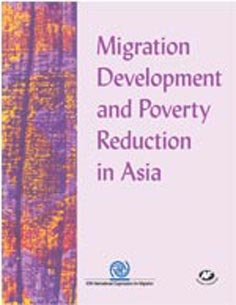
Paperback • 2008
Pages: 268
ISBN 978817188573x
INR 795
For Sale in South Asia Only
+ Add to Cart
Publisher:Academic Foundation
BrochureMigration, Development and Poverty Reduction in Asia
International Organization for Migration (IOM )
International Organization For Migration
About the Book
<p>Earlier versions of the papers in this volume were presented at the “Regional Conference on Migration and Development in Asia”, held in Lanzhou, China, 14-16 March 2005. The conference, hosted by China’s Ministry of Foreign Affairs, was organised by IOM and funded by Britain’s Department for International Development (DFID).Though there has been increasing attention paid to the potential role migration can play in fostering development, most of that attention has tended to focus on international migration. Internal migration has been somewhat neglected but is also an extremely important policy area.One of the key aims of the Lanzhou conference was to identify more effective ways to enhance the benefits of internal migration for poverty reduction and development, and how this could be complemented by strategies to ensure that migrants have decent working conditions and access to health and social services.</p> <p><strong>ABOUT IOM (International Organization for Migration): </strong> <br /> IOM is committed to the principle that humane and orderly migration benefits migrants and society. As an intergovernmental body, IOM acts with its partners in the international community to: assist in meeting the operational challenges of migration; advance understanding of migration issues; encourage social and economic development through migration; and uphold the human dignity and well-being of migrants.</p>
Socio-economic / -political /17 of 18
Hard-cover • 2015
Pages: 358
ISBN 9789332701816
INR 1195
+ Add to Cart
Publisher:Academic Foundation
BrochureRevolutionising Corporate Social Responsibility
Towards a Sustainable Tomorrow
R.K. Mishra‚ Shulagna Sarkar‚ Punam Singh (Eds.)
About the Book
<p>There is a growing realisation that long-term business success can only be achieved by companies that recognise Corporate Social Responsibility (CSR) as part of the process of wealth creation and as providing a competitive advantage. This volume is a compilation of the CSR initiatives of various organisations. It presents the 21st century best practices and the dynamics of CSR for practitioners, academicians and researchers. This book is a sincere attempt to guide decision-makers in the area of CSR and help them to rethink their CSR practices.</p>
Socio-economic / -political /18 of 18
Hard-cover • 2015
Pages: 356
ISBN 9789332701946
INR 1195
+ Add to Cart
Publisher:Academic Foundation
BrochureThe Indian Social Sector
Trends & Issues
R.K. Mishra‚ Anand Akundy (Eds.)
About the Book
<p>From UNDP’s Human Development Index to the more recent Multidimensional Poverty Index, there have been conceptualisations and frameworks towards understanding social development.However,there have not been consistent efforts by governments,multilateral agencies, NGOs and disciplinary leaders in the academia towards contextualising the different concepts and frameworks for addressing social development. This book attempts to aggregate the various strands of discourse relating to social sector development in India from the academic and practitioners’ world. Social sector issues are not limited to health,education and housing, but encompass concerns relating to agriculture, food security, rural development, gender and livelihoods. Within that broad canvass, the objective of this collection of papers is to assess the performance and analyse the challenges of social sector programmes, policies and remaining issues.</p> <p><br /> The essays in this volume are written by specialists in diverse fields such as agriculture, health, education, nutrition, gender, food security, agrobiodiversity,poverty, minorities, rural development and livelihoods.Several of the essays relate to the debate about economic growth andsocial development, elegantly articulated by Jean Drèze & Amartya Sen:“Why has growth not produced commensurate social development or has done so with poor results?”’ Overall, these essays attempt to bring social development to centre stage and make inclusive growth a visible reality.</p>







